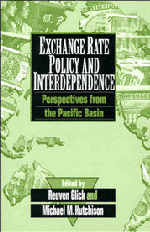Book contents
- Frontmatter
- Contents
- List of contributors
- Preface
- Exchange rate policy and interdependence
- 1 Overview
- I International financial market integration
- II Choice of exchange rate regimes
- III Intervention and sterilization policies
- IV Prospects for a yen bloc
- 13 On the possibility of a yen bloc
- 14 Economic fundamentals and a yen currency area for Asian Pacific Rim countries
- Index
13 - On the possibility of a yen bloc
Published online by Cambridge University Press: 04 May 2010
- Frontmatter
- Contents
- List of contributors
- Preface
- Exchange rate policy and interdependence
- 1 Overview
- I International financial market integration
- II Choice of exchange rate regimes
- III Intervention and sterilization policies
- IV Prospects for a yen bloc
- 13 On the possibility of a yen bloc
- 14 Economic fundamentals and a yen currency area for Asian Pacific Rim countries
- Index
Summary
Introduction
As regional economic and financial integration appears to proceed in the European Community (EC) and in North America, many wonder whether a similar economic bloc might form in Asia. Most speculate that Japan would become a dominant player in such a bloc owing to its strong economic position compared with that of other countries in the region. This essay considers whether it is possible or probable that a so–called yen bloc will emerge in Asia.
The term “yen bloc” has different interpretations. Some economists and policymakers think of a yen bloc as an area where the yen is used extensively in transactions outside the legal national boundary of Japan as an invoice or vehicle currency. The larger the number of international transactions denominated in the yen, the greater the political incentive to form a currency area in which other currencies are pegged to the yen. The yen bloc in this view typically means an Asian version of the European Monetary System (EMS) with the yen playing the role of the deutsche mark as the anchor currency.
Others use the term “yen bloc” more broadly to refer to an economic bloc, such as a free trade zone or a tariff union, where intraregional transactions are preferentially treated in terms of inspections, tariffs, and quotas. In this view Asian countries have an incentive to form such a bloc to counterbalance the increasing regionalization of trade and finance in the EC and in North America in the 1990s.
Information
- Type
- Chapter
- Information
- Exchange Rate Policy and InterdependencePerspectives from the Pacific Basin, pp. 317 - 343Publisher: Cambridge University PressPrint publication year: 1994
Accessibility standard: Unknown
Why this information is here
This section outlines the accessibility features of this content - including support for screen readers, full keyboard navigation and high-contrast display options. This may not be relevant for you.Accessibility Information
- 3
- Cited by
